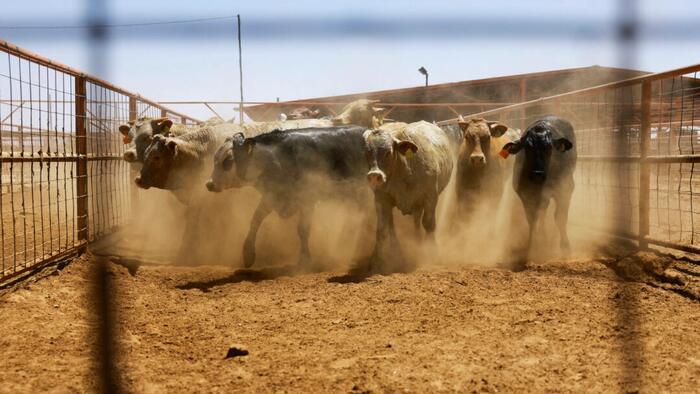Agriculture Secretary Announces Update As Flesh-Eating Screwworm Comes Within 70 Miles Of US Border

Authored by Naveen Athrappully via The Epoch Times (emphasis ours),
More than 8,000 traps have been deployed across Texas, Arizona, and New Mexico, targeting the New World screwworm (NWS) flies, Secretary of Agriculture Brooke Rollins said in a Sept. 26 post on X, adding that no additional NWS infections have been detected since last Sunday.
On Sunday, Sept. 21, an announcement was made by the U.S. Department of Agriculture (USDA), which said that Mexico’s National Service of Agro-Alimentary Health, Safety, and Quality had confirmed a new NWS infection in Sabinas Hidalgo, Nueva Leon state, less than 70 miles from America’s southern border. The infected animal was an 8-month-old cow.
Earlier in July, an NWS infection had been reported 370 miles south of the U.S.–Mexico border.
In her post, Rollins said that over 13,000 screening samples have been screened, and zero NWS flies have been identified thus far.
In addition, 750,000 sterilized NWS flies are being trucked in and dispersed in the Nueva Leon region twice a week, she said.
Mass-produced, sterile male NWS flies are often used to tackle the spread of wild NWS fly swarms. When these sterile flies are released into a swarm in large numbers, they mate with the wild female flies, which end up laying unfertilized eggs, thus lowering the swarm population.
Tackling NWS swarms is crucial since they pose a major threat to livestock. In an Aug. 15 statement, USDA called NWS a “devastating pest.”
“When NWS fly larvae (maggots) burrow into the flesh of a living animal, they cause serious, often deadly damage to the animal. NWS can infest livestock, pets, wildlife, occasionally birds, and in rare cases, people,” the agency said.
“It is not only a threat to our ranching community, but it is a threat to our food supply and our national security.”
Since May, U.S. ports have been closed to imports of cattle, horses, and bison from Mexico to prevent the spread of NWS flies into the United States.
Rollins accused Mexico of having “failed to enforce proper cattle movement controls and neglected to regularly maintain fly traps as agreed, undermining detection efforts.”
“This is unacceptable,” she said in the post on X. “Mexico must immediately implement agreed-upon protocols, expand surveillance, and restrict cattle movement in infected zones. For the foreseeable future the border will remain closed.”
In a Sept. 22 statement, Mexico’s Secretariat of Agriculture and Rural Development said that the Sept. 21 detection was of an NWS fly in its larval stage, “meaning there is no possibility of the fly emerging.”
Moreover, the trapping system set up throughout northern Mexico has so far not detected a single NWS fly, said the statement.
“Mexico has established an identification and communication protocol at approved feedlots in the north of the country to immediately detect and eliminate cases and prevent any further incidents.”
Last month, Health Secretary Robert F. Kennedy Jr. signed a declaration empowering the Food and Drug Administration to authorize drugs aimed at preventing or treating NWS infections among animals.
“Today we are taking decisive action to safeguard the nation’s food supply from this emerging threat,” Kennedy said in a statement.
“This authorization equips FDA to act quickly, limit the spread of New World Screwworm, and protect America’s livestock.”
Currently, no drugs have been approved by the FDA to prevent or treat NWS infections. According to the FDA, its Center for Veterinary Medicine is working with companies to identify drugs that can work against the parasite.
Meanwhile, a travel-related human case of NWS infection was detected last month in an individual from Maryland, the Department of Health and Human Services announced on Aug. 25.
The infection was detected after the individual returned to Maryland from El Salvador, Department of Health and Human Services spokesperson Andrew Nixon told The Epoch Times in an emailed statement.
“This is the first human case of travel-associated New World screwworm myiasis (parasitic infestation of fly larvae) from an outbreak-affected country identified in the United States,” he said, adding that the case posed a “very low” risk to public health in the United States.
Aldgra Fredly contributed to this report.



